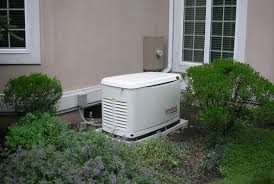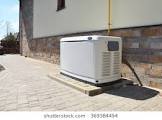Backup Generators
Residential standby generators are increasingly common, providing backup electrical power to HVAC systems, security systems, and household appliances such as refrigerators, stoves, and water heaters.
As you consider the purchase of a back-up generator here are some things to think about:
SMALL stationary: 5,000 to 8,500 watts
The basics, plus:
- Portable heater (1,300 watts)
- Computer (250 watts)
- Heating system (500 watts)
- Second pump (600 watts)
- More lights (400 watts)
LARGE stationary: 10,000 to 15,000 watts
The Small, plus:
- Clothes washer (1,200 watts)
- Electric dryer (5,000 watts)


